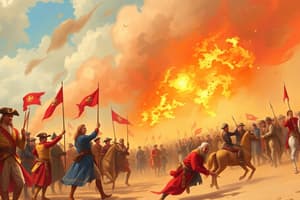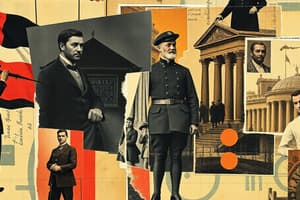Podcast
Questions and Answers
What were the significant political outcomes of the 1848 Revolutions in Europe?
What were the significant political outcomes of the 1848 Revolutions in Europe?
- The end of all forms of government
- The unification of all European countries under one government
- A wave of nationalism and movements for independence (correct)
- The establishment of monarchies across Europe
Which event was directly influenced by the revolutionary ideas of democracy and individual rights in Europe?
Which event was directly influenced by the revolutionary ideas of democracy and individual rights in Europe?
- Russian Revolution (correct)
- American Civil War
- Unification of Italy
- World War I
What was the primary aim of the European Union when it was created after World War II?
What was the primary aim of the European Union when it was created after World War II?
- To promote cooperation and prevent future conflicts (correct)
- To unify the military forces of Europe
- To establish a single European currency immediately
- To dominate all European countries economically
What was a notable impact of World War I on Europe?
What was a notable impact of World War I on Europe?
The Treaty of Versailles primarily aimed to address which of the following following World War I?
The Treaty of Versailles primarily aimed to address which of the following following World War I?
What were the main goals of the Revolutions of 1848 in Europe?
What were the main goals of the Revolutions of 1848 in Europe?
What was a significant outcome of the Russian Revolution in 1917?
What was a significant outcome of the Russian Revolution in 1917?
Which event in the 20th century significantly impacted the formation of international alliances in Europe?
Which event in the 20th century significantly impacted the formation of international alliances in Europe?
How did World War I influence geopolitical changes in Europe?
How did World War I influence geopolitical changes in Europe?
What did the Treaty of Versailles impose on Germany after World War I?
What did the Treaty of Versailles impose on Germany after World War I?
Flashcards
Thirty Years' War
Thirty Years' War
A devastating conflict in Central Europe (1618-1648) primarily involving Protestant and Catholic states.
Peace of Westphalia
Peace of Westphalia
Ended the Thirty Years' War (1648), establishing the principle of state sovereignty and modern nation-states.
Treaty of Utrecht
Treaty of Utrecht
Ended the War of Spanish Succession (1713), marking the rise of British power and decline of French dominance.
American & French Revolutions
American & French Revolutions
Signup and view all the flashcards
European Union (EU)
European Union (EU)
Signup and view all the flashcards
Congress of Vienna
Congress of Vienna
Signup and view all the flashcards
Revolutions of 1848
Revolutions of 1848
Signup and view all the flashcards
Unification of Germany
Unification of Germany
Signup and view all the flashcards
World War I
World War I
Signup and view all the flashcards
Russian Revolution
Russian Revolution
Signup and view all the flashcards
Study Notes
Political History of Modern Europe
- Political history studies past events, movements, leaders, and systems of governance
- It examines how power is acquired, maintained, and challenged, shaping societies over time
- Covers governments and institutions, including forms of government (monarchies, democracies, dictatorships) and how institutions (like parliaments, courts, and bureaucracies) function
- Focuses on significant political movements and revolutions that have altered history (e.g., French Revolution, Russian Revolution, civil rights movements)
- Analyzes influential leaders and thinkers, their decisions, ideologies, and impact on nations
- Examines causes and consequences of wars (civil and international), how wars reshape borders, societies, and political power
- Includes relationships between nations, including treaties, alliances, and conflicts, which shape global politics
- Modern Europe has been shaped by transformative events and movements influencing the continent and the wider world
- The late 18th century to the 21st century is marked by struggles for power, identity, and governance
- The American and French Revolutions in the late 1700s inspired European movements for rights, freedoms, democracy, and equality, leading to national independence and unity
- World Wars (especially WWII) led to cooperation among European countries and the creation of the European Union (EU), aiming for peace and economic stability
- Key events include the Thirty Years' War (1618-1648), Treaty of Westphalia (1648), defining state sovereignty and the modern nation-state system
- 18th century events include the Treaty of Utrecht (1713), ending the War of Spanish Succession, and the American and French Revolutions (1776 and 1789) promoting democracy and individual rights
- 19th century events include the Congress of Vienna (1815), establishing a balance of power after the Napoleonic Wars, and the Revolutions of 1848 across Europe (demanding political reform, national unification, and democracy) and unification of Germany (1871)
- 20th century (1900s): World War I (1914-1918), Russian Revolution (1917), Treaty of Versailles (1919), Great Depression (1929), World War II (1939-1945), end of WWII and the Cold War, division of Europe into East and West, and creation of NATO (1949)
- 20th century (1980s-1999) includes the Single European Act (1986), fall of the Berlin Wall (1989), collapse of communist regimes in Eastern Europe, Maastricht Treaty (1991) establishing the European Union (EU), and the dissolution of the Soviet Union (1992)
- The 21st century shows the introduction of the Euro currency (2002), enlargement of the EU (2004), Treaty of Lisbon (2007) reforming EU structures, Brexit (2016), and ongoing challenges like migration, security, COVID-19 pandemic, and climate change
Studying That Suits You
Use AI to generate personalized quizzes and flashcards to suit your learning preferences.





